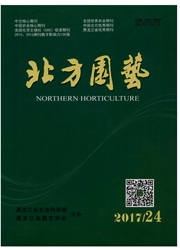

 中文摘要:
中文摘要:
对12株分离自四川攀枝花的相思树根瘤菌进行了耐酸碱、耐盐、耐高温或低温、抗菌素抗性等抗逆性研究。结果表明:该区的相思树根瘤菌具有很强的耐酸碱性,所有菌株都能耐受pH 4~12的环境。耐盐性普遍较差,有83.3%的菌株不能在1%的NaCl平板上生长,16.7%的菌株能耐受2%的NaCl。对温度的适应范围较宽,分别有100%、33.3%的菌株经37℃、60℃处理30 min后仍能生长,所有菌株均不能耐受4℃的低温,在10℃的环境中有16.7%的菌株表现活力。对抗菌素的抗性差异很大,其抗性普遍表现为:林可霉素〉头孢菌素〉氨苄青霉素〉链霉素〉卡拉霉素和庆大霉素。筛选到抗逆性强的优良菌株2个:Sacr1、Sacr2。
 英文摘要:
英文摘要:
12 rhizobia isolated from Acacia in Panzhihua of Sichuan Province were tested on their tolerance to pH, NaCl, temperature variation and intrinsic antibiotic. The results indicated that all strains could grow at a range of pH from 4- 12, 83.3% of strains could not tolerate NaCl stress at 1% concentration, only 16. 7% strains could tolerate 2% NaCl. 100. 0% or 33.3% of strains could grow after being exposed to 37℃ or 60℃ for 30 rain, and all strains couldn't grow at 4℃, 16. 7% strains could grow at 10℃. The tested strains had high differences in resistance to different intrinsic antibiotics, such as generally lincomycin resistance〉cephalosporin resistance〉ampicillin resistance〉streptomycin resistance〉 kalamycin and gentamicin resistance. Altogether, 2 strains i. e. Sacrl and Sacr2 showed high ability of tolerance to salt, acid, alkali, low and high temperature, different intrinsic antibiotics.
 同期刊论文项目
同期刊论文项目
 同项目期刊论文
同项目期刊论文
 Horizontal gene transfer and recombination shape mesorhizobial populations in the gene center of the
Horizontal gene transfer and recombination shape mesorhizobial populations in the gene center of the 期刊信息
期刊信息
